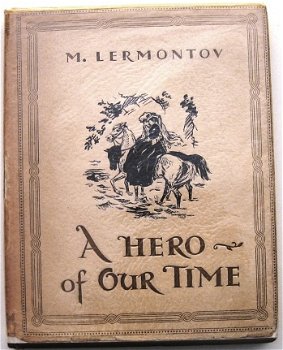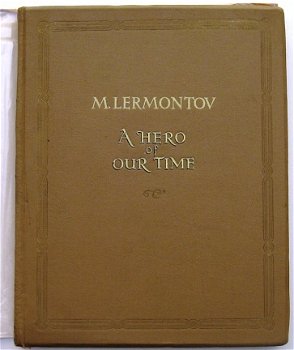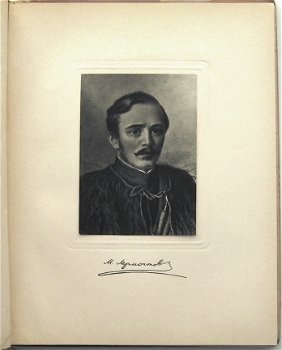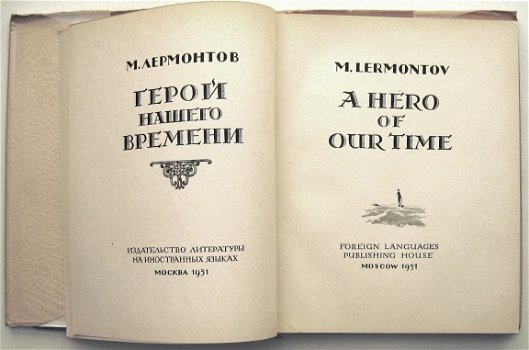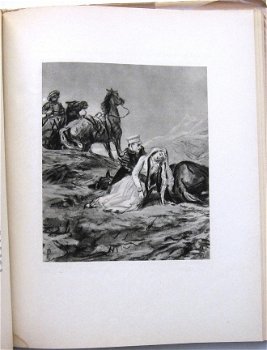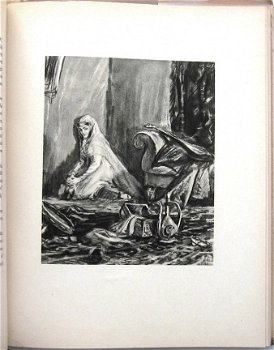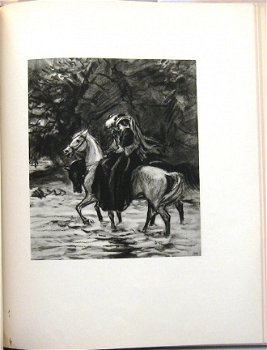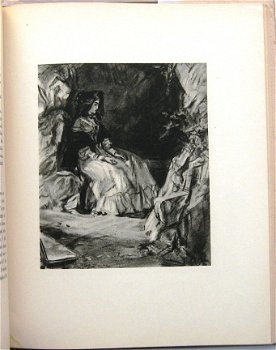
Lermontov 1951 A Hero of Our Time - Rusland Literatuur
Kenmerken
- Conditie
- Gebruikt
- Levering
- Niet van toepassing
Omschrijving
Hardcover met stofomslag. Lermontov, M. A Hero of Our Time. Moscow: Foreign Languages Publishing House, 1951. 173 blz. Formaat circa 26 x 21 cm. Stofomslag voorzien van beschermende plastic hoes, daarom wat reflectie op foto. Stofomslag met iets verlies ter hoogte van de rug (boven en onder). Boek voor leeftijd in goede staat. Titelpagina in het Russisch en Engels op tegenoverliggende bladzijden, tekst in het Engels. Voorin ingeplakte illustratie van Lermontov naar een portret van I. Astafyev uit 1883 voorzien van een in het papier in blinddruk gedrukte border. Met illustraties door D. Shmarinov en Maxim Maximych. Boekontwerp door F. Shtrikhova. Bovenaan hoofdstukken illustraties in zwart en blauw, andere illustraties in zwart-wit.
A Hero of Our Time (Russian: Geroy nashego vremeni) is a novel by Mikhail Lermontov, written in 1839 and revised in 1841.
It is an example of the superfluous man novel, noted for its compelling Byronic hero (or antihero) Pechorin and for the beautiful descriptions of the Caucasus. There are several English translations, including one by Vladimir Nabokov and Dmitri Nabokov in 1958.
The book is divided into five short stories or novellas, with an authorial preface added in the second edition. There are three major narrators. The first is a young, unnamed officer in the Russian army travelling through the Caucasus mountains. He is documenting his travels for publication later. Almost as soon as the story begins, he meets Captain Maxim Maximych, who is significantly older and has been stationed in the Caucasus for a long time. He is therefore wise to the lifestyle of Russian soldiers in this region, and immediately demonstrates this to the narrator through his interactions with the local Ossetian tribesman.
Maxim Maximych serves as the second narrator, relaying to his traveling companion stories of his interactions with Grigory Alexandrovich Pechorin, the main character of the story and the ultimate Byronic hero. Maxim Maximych was stationed in the Caucasus with Pechorin for some time, though when and for how long is not specified. Ultimately, Maxim Maximych gives Pechorin's diaries to the unnamed narrator. Pechorin seemingly abandoned them when he was discharged from his post, and the old Captain has been carrying them around since.
The third narrator is Pechorin himself. However, unlike the other two, he is not actually a character immediately in the story. Instead, he narrates through his diaries, which were published along with the unnamed narrator's travel notes after Pechorin's death. The diaries, however, seem to switch at least once from the past tense (as a diary would be written) to the present tense. Pechorin, the "hero of our time" is shown to be alternately impulsive and calculating through Maxim Maximych's stories. He is shown to be calculating, manipulative, emotionally unavailable and arrogant through his own recollections. However he is both sensitive and cynical as well as intelligent, a fact he is all too aware of.
In the longest novella, Princess Mary, Pechorin flirts with the Princess of the title, while conducting an affair with his ex-lover Vera, and kills his friend Grushnitsky (of whom he is secretly contemptuous) in a duel in which the participants stand in turn on the edge of a cliff so that the loser's death can be explained as an accidental fall. Eventually he rejects one woman only to be abandoned by the other.
The preface explains the author's idea of his character: "A Hero of Our Time, my dear readers, is indeed a portrait, but not of one man. It is a portrait built up of all our generation's vices in full bloom. You will again tell me that a human being cannot be so wicked, and I will reply that if you can believe in the existence of all the villains of tragedy and romance, why wouldn't believe that there was a Pechorin? If you could admire far more terrifying and repulsive types, why aren't you more merciful to this character, even if it is fictitious? Isn't it because there's more truth in it than you might wish?" (bron: Wikipedia).
Russische Literatuur Rusland. Referentienummer 9384.
40 euro
Uw bod is exclusief verzendkosten (6,95 euro als pakketje), afhalen op afspraak ook mogelijk. Zie ook mijn andere advertenties voor gecombineerd verzenden.
